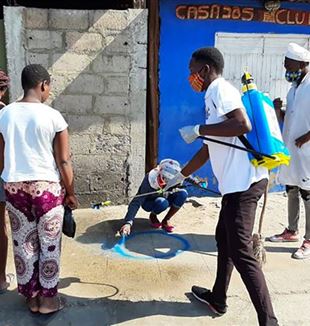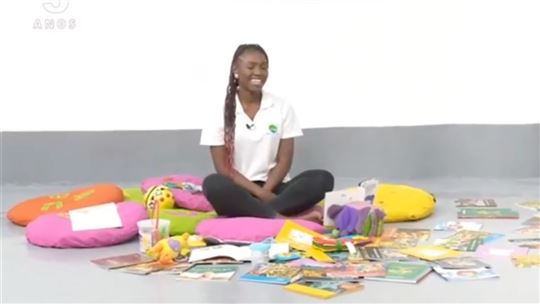
Mozambique: fairy tales on the telephone
Isabel lives in a Maputo slum and is at home because of lockdown. Her only connection to her school are Misnia's calls, who reads stories to her. An initiative of AVSI that, in addition to health awareness, tries to fill the educational void.It is now 10:00, and Isabel waits impatiently by the phone. She has an appointment with Misnia, the librarian. Amiga Misnia, her friend. She calls her to tell her a story. In normal times, Isabel and her schoolmates would go straight to the library, they would all sit in a circle and listen to fairy tales. But now that the school is closed, that this virus has messed up all big and small daily appointments, the only way Isabel can hear about princesses, knights and talking animals is on the telephone.
Since May 23, Mozambique has also been in lockdown. There are only a couple of thousand Covid tests available for a population of 30 million. Officially, there are just over 200 reported cases. The dead? One. And yet, schools closed, offices have a third of people on rotation, masks on public transport, a visa blockade. And if these Covid numbers appear small compared to Italian, American or South American numbers, here, in a country where poverty still prevails, it is better to try to prevent a pandemic, which the national health system would not manage adequately. "The few tests available," says Martina Zavagli, who has been in Maputo on behalf of AVSI for some years, "are used for those who have clear symptoms. If a person tests positive, the thirty people with whom the infected person has come into contact with in the previous days are identified and tested.” But the real problem is that the closure of work activities (a largely "informal" economy, made up of street stalls) risks seriously jeopardizing survival.
Moreover, one of the great concerns is that less than an hour's drive from Maputo, the capital, is the border with South Africa, which has reached almost 30,000 infections. And many Mozambicans cross (or used to cross) the border every day for work.
Martina first worked in South Sudan and "there the social and political situation was much more dramatic." Today she specifically manages projects concerning education. One of these is the collaboration with the Xtinza cultural center, in the slum of Nhamankulo, one of the poorest neighborhoods on the outskirts of the city. It is here that the library where Misnia reads stories has been set up. "Previously we were in contact with about ten schools: 2,000 - 2,500 children. How do we keep in touch with them?", Martina and her colleagues from AVSI asked themselves. In addition, the lockdown of schools has created a really cumbersome situation: the little homework that the teachers manage to circulate is in Portuguese and not all families understand it, as they speak mainly local dialects. The risk is that children will spend too much time without education and educational relationships. And worst of all, when lockdown is over, many may not return to their desks because they are now busy helping their parents at work.
Thus, "Misnia records the readings and we pass them onto social channels, or they are broadcast on local radio or Sucesso TV. We also send them via WhatsApp to parents. and
We also set up phone appointments with those who do not have smartphones, radio or TV,” just as we did with Isabel, "to keep the relationship that was created alive, which parents also care a lot about.”
Read also – Albania: impossible gratitude, between Covid and the rubble
In Maputo, during this period, AVSI is also trying to raise awareness of hygiene in the poorest neighbourhoods: in the streets, with loudspeakers mounted on apecars or distributing information leaflets. The children are also on the front line: "Carolina, four years old, who lives in the informal district of Chamanakulo, is part of the "committee" of children that speaks to other peers explaining what Covid is in their own language, how to prevent it, how important it is to wash your hands and how to put the mask on well and always," explains Martina: "Here, families live in very precarious conditions and try to do everything possible to prevent the spread of the virus and they also do so by involving their children.” Just like Carolina.#Avsi